#Napoleon’s invasion of Egypt
Text

I’m not 100% sure who this is, but I think it’s Desaix.
#desaix#general desaix#Louis Desaix#French Revolution#napoleonic wars#napoleonic#painting#France#french#Egypt#hieroglyphs#Napoleon’s invasion of Egypt#french invasion of Egypt#napoleonic era#1700s#1790s#1800s#19th century#18th century#french empire#history#Napoleon’s marshals
24 notes
·
View notes
Note
Now I'm curious: what happened to Tallien to consider him a worse loser than Barras? I only know his involvement in Thermidor and the fact that Theresia left him after all the mess he did to go with a richer banker... Did he embarrass himself in other ways?
How much time do we have? Look, I don't know a lot about Barras, but nothing - nothing - can be as embarrassing as Jean-Lambert Tallien. He is the biggest loser both in terms of "a flop" and "who lost during the revolution" (and he lost more than many people who ended up guillotined, imo).
And I don't even know how/why it happened! He started out okay - he had modest skills but seemed honest about the revolution. Then Bordeaux happened. Thermidor and months after were Jean-Lambert's five minutes of fame, but then it dissolved quickly, both in his professional and in private life.
The Quiberon Invasion mess in 1795 is one of the first examples, when he and Hoche (well, Tallien mostly because it was his orders) executed 750 royalists even after promising they'd be treated like prisoners of war. Yes, those were royalists who made an invasion on France so it's not surprising that they died, but 1) Hoche I think promised they'd be spared but Tallien ordered the execution, 2) Tallien was the one who ran his mouth so much after Thermidor about sparing people and now he executed in one day half of the number of people that were executed in the entire Great Terror, and 3) Seems like Tallien had some pro-royalist dealings/conversations with foreign powers (Spain mostly) and wanted to do a cover-up (? - will need to look into this further).
In his private life, Theresia wanted to leave him as early as 1796 and was reportedly banging Barras, but Tallien begged her to give him another chance. She said yes, and 9 months later she gave birth to a stillborn boy. We are not sure if the baby was Barras' or Tallien's.
Life in the Directoire was not great for Jean-Lambert and he was struggling with money, so he joined Napoleon's expedition to Egypt. It was horrible; he was miserable and suffered health problems. He wrote clingy letters to Theresia ("Care for our daughter and be faithful to me, my love!") (Spoiler: She was already on kid number two by the banker). The letters were intercepted by the enemy and read publicly. On his way from Egypt, Tallien was arrested and spent some time with the enemy but was released. Coming back from France must have been horrible, though, because Theresia asked for a divorce (and by the time it was done, she was already pregnant with banker's baby number 3). Because the kids were technically conceived while she was married to Tallien, they later successfully asked to have Tallien as their last name and were known as "Tallien bastards" in the family.
After, it was just a series of bad circumstances and decisions. Theresia remarried, to a Belgian prince, and we have a letter where Tallien begged her not to do that. Fouché tried to help him and found him a job in Alicante. But it was horrible because the whole town was infected by the Yellow Fever. Tallien contracted it and lost one eye. It is also possible that this is where he got leprosy (?)
When he got back to France, he was a ruin. He supported Napoleon in 1815, hoping to get some influence (I assume), but then Waterloo happened so another bad call for Jean-Lambert. He lived in poverty and only escaped banishment during the Bourbon restoration because of his poor health. He died at 53 of leprosy (at least wiki claims so - I could never verify it but we know he suffered poor health for years).
And on top of that - on top of that! - his magnum opus, his legacy, the thing that lives on for 200+ years, is not associated with him. Nobody knows of Jean-Lambert Tallien and his most crowning achievement: the invention of the Terror and evil mastermind Robespierre. Sure, he wasn't the only one involved in that, but he did play a crucial role and, arguably, it is the most historically important thing that he did. And nobody knows it was him! So many people hate Robespierre for 200+ years, but nobody knows who is responsible for forging that smear campaign. (Yes, I am aware that it's the point: if people knew it was constructed, and by specific people, they wouldn't view it in the same way, because the main thing about the Terror how it's seen is that it's an objective thing that happened just as described. But allow me this Tallien rant).
So.. yeah.
42 notes
·
View notes
Note
ummm that stone is massive, there's no way it could just "fall over". just say napoleon blew it off, we all know he used the sphinsx for target practice so why not this
a) the nose was documented to not be on the Sphinx in 1737, 61 years before Napoleon's invasion of Egypt. 32 years before Napoleon was born, in fact. The nose was deliberately hacked off sometime between the 3rd and 10th centuries AD, as the area around the nose bears hallmarks of tools.
b) several large earthquakes have occurred in Egypt (885 AD, 1068, and, if we're being pedantic, 1754). Many of the temples you see today have been restored to look like they did, but at one point were simply rubble and ruins. Things tend to fall over in earthquakes, especially if they've been left to ruin.
c) a cannon ball would have obliterated a stele made from granodiorite rather than simply breaking it in two cleanly. An impact pattern from a cannon ball hits in one place and then fans out, much like a bullet hitting glass. If such a thing hit the rosetta stone we wouldn't just have one section broken diagonally at the top, and a bottom corner missing.
d) someone's never heard of the Description de l'Égypte and it shows
282 notes
·
View notes
Text
Desaix / ドゼー and Clive / クレーベ
Desaix (JP: ドゼー; rōmaji: dozē) is the chancellor of Zofia who stages a coup of the kingdom in Fire Emblem: Gaiden and Echoes: Shadows of Valentia. He is named after Louis Desaix (JP: ルイ・ドゼー; rōmaji: rui dozē), one of the most highly regarded generals of the French Revolutionary Wars. Born into a noble house, Desaix began his military training at age eight. By age 15 he was a second lieutenant. After the Revolution began, he served under Victor de Broglie, chief of staff of the Army on the Rhine. Desaix would quickly ascend through the military, serving as a commander under Jean-Baptiste Jourdan and Jean Victor Marie Moreau during the invasion of Bavaria. Soon after meeting General Napoleon Bonaparte in Italy, Desaix was assigned to the campaign in Egypt. There he continued to prove a valuable asset as a commander in the Battle of Alexandria and Battle of the Pyramids. His victories over Murad Bey the Mamluks earned him the title of "Just Sultan" among the peasants of Egypt until authority was given to his fellow commander Jean-Baptiste Kléber. Desaix would join Bonaparte in Italy once more, where he died in the Battle of Marengo.
Clive is the former leader of Zofia's resistance force - the Deliverance - against the Rigelian Empire and Desaix's coup before relinquishing command to Alm. His name may be derivative of Robert Clive, a British baron and colonial, who became the first British to govern the Bengal Presidency largely credited for the East India Company planting roots in that region of India. More likely, it was a close approximation of Clive's Japanese name.
In Japanese, Clive's name is クレーベ (rōmaji: kurēbe), officially romanized as Clerbe. This seems to be a corruption of the surname of a contemporary to Desaix and Bonaparte, Jean-Baptiste Kléber (JP: ジャン=バティスト・クレベール; rōmaji: jan-batisto kurebēr). Unlike his fellow generals, Kléber was common-born, which withheld his promotion under the French Royal Army. At the outset of the Revolutionary Wars, he reenlisted, where he quickly rose through the ranks, eventually becoming second-in-command. He participated in the campaign in Egypt and Syria. However, when the expedition turned sour for Napoleon, the general withdrew, leaving the remaining French army holding Egypt in the hands of Kléber without a word prior. And it would be in Cairo that he would be assassinated, on the same day that his close friend Louis Desaix would be killed in action. While Kléber was highly regarded by Napoleon for his skill, Emperor-to-be had the commander buried on a remote island, fearing his tomb to be used as a symbol of Republicanism.
While the character of Clive is not of common birth, the reference to Kléber is likely meant to allude to his desire to fight alongside the commonfolk under the banner of the Deliverance. Him being in conflict against the encroaching empire could relate to Napoleon's interpretation of his character as representing Republicanism. Additionally, Clive stepping down from leadership of the Deliverance could be based on Kléber declining supreme command over the French Revolutionary Army.
On the other hand, Louis Desaix's position as "sultan" over Egypt during the bulk of the Egyptian and Syrian expeditions was likely the primary reason for Desaix's name and role in the story, aiding the Rigelian Empire's expansion into Zofia while gaining greater social standing over the region.
20 notes
·
View notes
Note
Hello! I wanted to ask if you knew what where the Montagnards views on Cosmopolitanism and foreigners like! Also was Orientalism as strong (? Popular? I don’t know if that is the right word sorry! My English is a bit wonky) in the late 18th century as it was in the 19th century? Thank you so very much <3
It’s hard to talk about montagnards/girondins/thermidorians etc as holding a collective view on something, as these groups were not like modern political parties with a firm set of goals and values neatly presented in a party program. But looking over the Constitution of 1793, which it must be said was mainly worked out by montagnards, we find the following part, which suggests that, at least ideally, the montagnards held a positive (or at least not negative) view on foreigners:
On reports between the French Republic and Foreign Nations
The French people are the natural friend and ally of free people
It does not interfere in the government of other nations, even if other nations interfere in their own.
It will offer asylum to foreigners banished from their fatherland for the sake of liberty. It will refuse this asylum to tyrants.
It will not make peace with an enemy occupying its territory.
The key word here is of course ideally, as this constitution was never actually never put into place due to the situation France was currently in. And on April 16 1794 we instead find Décret sur la police générale de la République: du 27 germinal, l’an II de la République française une et indivisible which declared that any foreigner (with a few exceptions, like children and elders) from nations France was currently at war with should get out of the country’s urban areas if they knew what was best for them:
No ex-noble, no foreigner from the countries with which the Republic is at war, can live in Paris, nor the strongholds, nor the maritime towns during the war. Any noble or foreigner in the above case who is found there in ten days is outlawed.
The idea that every counterrevolutionary within France was actually a paid agent of a big foreign conspiracy was of course also a thing (and not only among the montagnards). Though this still might be best viewed as ”mistrust of foreign nations you’re currently at war with” (which at one point was basically all of Europe) rather than ”mistrust of foreigners in general.”
As for Orientalism in the 18th century, according to Edward Said’s Orientalism (1978): ”What is distinctive about the late eighteenth and early nineteenth centuries, which is where this study assumes modern Orientalism to have begun, is that an Oriental renaissance took place. […] This awareness was partly the result of newly discovered and translated Oriental texts in-languages like Sanskrit, Zend and Arabic. It was also the result of a newly perceived relationship between the Orient and the West. For my purpose here, the keynote of the relationship was set for the near East and Europe by the Napoleonic invasion of Egypt in 1798, an invasion which in many ways was the modem of a truly scientific appropriation of one culture over another, apparently stronger one.” (page 42)
In Said’s view, what we today call Orientalism did in other words not really exist until the late 1790s, which leads me to believe it was not strong during the 18th century overall… On the other hand, I’m far from an expert when it comes to the concept, so I don’t know if this is a controversial issue or whatever. The same thing goes for cosmopolitanism, though I did find an article and a blog post about this topic specifically in relation to the French revolution.
#a bit of an anticlimactic answer with how long I’ve had this in my inbox…#but yeah this is far from my territory sorry#frev#ask
16 notes
·
View notes
Text
There are honestly so many fundamental things about Ridley Scott's Napoleon I disliked, I hardly know where to start so here's just a couple things that popped into my head. All of the disappointed/angry reviews I saw really were on the money with their criticisms. Below the cut a bunch of things in no particular order
Apart from the scenes in Egypt and Elba (which are sepia-tinted) the entire movie is colorgraded with a blue-grey tone like the most painfully dreary wet day in late autumn. Just watching it I got hypothermia. Just take these two shots - the first from the 1970 waterloo movie (highly recommended, can be found for free on youtube), the second from 2023 - to see the difference.
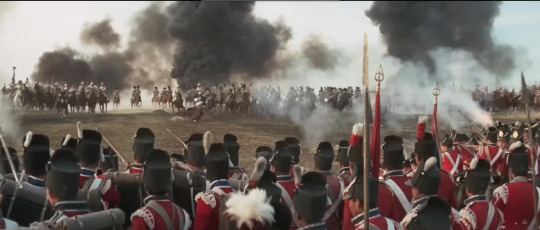
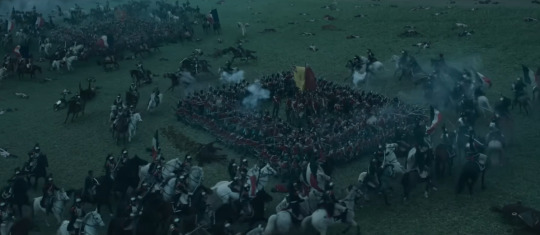
Despite a massive budget and cgi available the battles actually felt incredibly small. The Waterloo scene in particular felt like it was taking place on a patch of grass that was a 100 meters square, with two thin lines of French infantry advancing towards a relatively small group of British infantry dispersed within a couple meters of trenches, with the tents of their camp only meters directly behind that. It gave the entire thing the sense like it was a large reenactment society of maybe 200 people giving it their all, rather than 140.000. The 1970 Waterloo might be 50 years old but showed vastly, vastly more impressive scenes of huge formations of men, offering awe-inspiring cinematography compared to Scott's tiny Waterloo skirmish. I'm perfectly willing to accept disgustingly bad historical accuracy as long as the pictures are sufficiently pretty. They were not.
As a note, in the movie the British infantry inexplicably decides to walk forwards out of their fortified trenchline on the slope (complete with spikes) and form squares in front of it, instead of simply staying inside of their trenches.
There's a fucking sniper at Waterloo. Like, an infantryman with a rifle with a scope on it. He blows a golfball-sized hole in Napoleon's hat.

The Marshals - each colorful, fascinating characters many of whom would individually be worthy of their own movie - are less than background characters; I don't think any were even mentioned by name, and there's only two or three that are regularly seen on screen. Marshal Ney, famous, brave, tragic Ney, who has a very distinctive redhead appearance, was rendered completely unrecognizable by adding a moustache.
Phoenix's Napoleon has no charismatic presence whatsoever. Anyone who wasn't already reasonably familiar with Napoleon before seeing this movie would be dumbfounded why so many people followed him at all, or why upon his return from Elba thousands of soldiers sent to stop him simply deserted to his cause as soon as he approached. If you want to create a movie to deconstruct Napoleon from a brilliant national hero to a flawed man there are infinite ways to do so, and they chose the most sub-par by just making him kinda odd and insecure.
Napoleon's military genius is underexplored if not entirely absent from the movie, and to a large extent it simply feels like events are just kinda happening to him, especially with the way short disparate scenes are quickly strung together. One second we're in the aftermath of Austerlitz (1805), and two or three 1-minute scenes we're at the invasion of Russia (1812). Some of Napoleon's finest moments as a general are omitted from the film such as the Italian campaign, Jena-Auerstedt, and the six-day campaign of 1814 where Napoleon so thoroughly outgeneralled his opponent his tiny 30K man army inflicted nearly 30K casualties on enemy forces twice his size over the course of four battles.
Meanwhile his crowning achievement at Austerlitz is reduced to yelling thrice for hidden units to attack and then the entire enemy army flees onto an ice lake fit for a fantasy movie (just check out the ice scene from the 2004 King Arthur) and gets sunk by cannon fire. If you've seen the trailer you've seen almost the entire battle.
Huge parts of the movie are devoted to his marriage to Josephine, which I personally don't find terribly interesting to begin with, and historical events are contorted to be related to his marriage (such as ditching his army in Egypt because she's cheating on him), but it often felt to me like this storyline, such as it was, was firing in certain directions only to abruptly cut them off or let them go nowhere, and the movie seemed unsure whether it was the A-plot or the B-plot or a secret third thing.
Before I forget... not once but twice Napoleon is charging into the thick of the melee on horseback!!! First where he is at the very front of a cavalry charge at Borodino (the 30 seconds of it that we got, which were all in the trailer) and second near the end of Waterloo before making a run for it. And it's so patently absurd! It's like a WW1 movie with Kaiser Wilhelm personally storming the trenches or Emperor Hirohito flying a plane at Pearl Harbor. Napoleon demonstrated plenty of bravery in his life (such as when he was wounded by a bayonet at Toulon, or attempted to lead a charge at the bridge at Arcole) but the Emperor of the French was not at the fucking forefront of a massed cavalry charge with sabre in hand scything down infantrymen.
The movie ends with a card with casualtyfigures from a bunch of battles as if it's a sobering statement at the end of a Holocaust movie, so the Brits can remind you Napoleon was actually Hitler.
#napoleon movie#I've seen bad movies in my life but I've never been so disappointed by one#I wanted it to be good. And it was the opposite.
14 notes
·
View notes
Text
reading the afterword of orientalism and he mentions Abd al-Rahman al-Jabarti's eyewitness writing of napoleon's invasion of egypt and goes on to describe how napoleon's 'description de l'egypte' combined with jabarti's works convey a historical experience that to this day gets minimized and flattened to an essential 'east vs west' battle. and i'm not familiar with jabarti so I go to his wikipedia page and the whole article reeks of that same orentialist thinking and writing style that the entire book is elucidating and critiquing. its honestly extremely frustrating
14 notes
·
View notes
Text
I’m not an expert in late 18th/early 19th-century French history, so I’ll leave most of the analysis of this chapter to those more familiar with the material than I am, but I do want to add this link:
http://thesiecle.com/supplemental11/
The Siècle podcast read aloud this chapter and included a version with links and annotations below if anyone`s interested!
For the material I am a bit more familiar with:
“Colonel Selves was going to Egypt to become Soliman-Pasha.”
A former soldier in Napoleon’s army, Colonel Selves (Sève) converted to Islam and went to live in Egypt, where he worked in the military. Egypt’s relationship with France during this period was complicated. Napoleon had occupied Egypt in 1798, and although he was soon driven out by various forces (the Ottomans, the British, local Egyptian forces), the impact of that invasion on Egypt remained. In the aftermath, Egypt’s governor gained a lot of power by eliminating many of his political rivals and began implementing reforms in various areas, including the military. He used Europeans (especially Frenchmen) to train his men in these fields (hence the presence of this colonel in Egypt). Many of them ended up getting Ottoman titles like “pasha” as well.
I don’t remember many references to French imperialism in this novel off the top of my head, but I’d be curious to look for them. Les Misérables covers a pretty crucial period for French colonialism in North Africa and the Middle East in particular: while alluding to Napoleon’s invasion here, it’s also notable that France invaded Algeria in 1830 (so during the time covered by the book). I don’t really trust Hugo to deal with this history well, but I’m curious about how present it will be. Here, this was more a contextualizing comment than anything else, underscoring how turbulent 1817 was for France.
Other notes:
“What separated two men more than an abyss was to say, the regicides, or to say the voters; to say the enemies, or to say the allies; to say Napoleon, or to say Buonaparte.”
The way people talk about Napoleon is going to continue to be important, so it’s good to remember it. “Buonaparte” is the Italian version of Napoleon’s last name (Bonaparte), and it was used to insult him because of his Corsican origins. We’ll see it employed by characters who particularly hate him (namely, royalists and really radical republicans).
I also like how Hugo ends the chapter with a sign that there will be plot-related stuff next:
“In this year of 1817 four young Parisians arranged “a fine farce.””
I don’t want to say this digression is unimportant, especially since Hugo specifies that history “neglects” these details and that it’s unfair to call them “trivial.” However, it’s funny that he spends the chapter on something completely unrelated to what we just read and ends with a single sentence suggesting that something will happen in the next chapter, with just a few signs telling us that we’ll be dramatically changing the scenery. First, we’re moving on to Paris. We’re reading about some young people there, so we’re no longer following Valjean. And the only connection to anything familiar so far is the year. I’ll miss Valjean, but the presentation of this is kind of hilarious.
Spoilers below:
It would be more hilarious if I didn’t know what the farce was and that Tholomyès is about to appear, I hate him so much that I’m actively dreading the next chapters.
#les mis letters#lm 1.3.1#1817#autocorrect on my laptop accepts Buonaparte as a spelling for Napoleon#now I know the 19th-century French political views of my computer#it rejects tholomyes though#I don't blame it
26 notes
·
View notes
Note
Lol bunking off the artillery ask, so we can be a completely deranged sociopath queen and (assuming we keep our capabilities on the ruling part) still rise to sit cozily on our blood soaked throne? Dang that's rad 😈
I hate it when stories punish the MC for being ruthless or crazy. Like it so obviously makes it so you have a "bad" ending. Ruthlessness is a quality that isn't expressly malicious in intent. People like Remiel don't wake up going "Mhm, it smells like a beautiful morning to go sicko mode and ruin the lives of others!" Its more like "Ah shit, lets see...whats the best way to get what i want and return the best investment for my effort?"
Ruthless characters in history have always existed and have been successful. Julius Caesar (you know him), Cao Cao (one of the warlords of the Three Kingdoms era), Augustus (first Roman Emperor), Qin Shi Huang (First Unifier of China), and Napoleon Bonaparte (Emperor of France and possibly last historical figure to stand with the men above.)
Is this something only linked with men? Fuuuuuck no. Lemme list some women up in here.
Wu Zetian The only Empress in China's 3,000-long history
Her reign was one of the more successful ones that economically benefited the country, militarily expanded the borders, and had an all-male harem for her own pleasure...home girl died at 81 after ruling for more than half a century.
Catherine the Great, Russian monarch who helped modernize her empire and even introduced vaccination to her people by being the first to try it out.
Hatshepsut, a female Pharoah of Egypt who put all the guys in her generation to shame. She launched a successful invasion, went on a building spree that following pharaohs would try to take credit for, and established new trading routes before dying in 1458 B.C. THATS 3,480 YEARS AGO!!!!! Give or take, i suck at math
Olympias, mother of Alexander the Great. Ima be honest. There wouldn't be an Alex if his momma didn't Game of Thrones the shit outta everyone else. She, "insisted she had a dream just before Alexander’s conception where a thunderbolt ignited her womb with an enormous fire." Supernatural street cred, check. She and her husband Philip II were fighting, baaaadly. So Philip married another girl and oh there popped a new baby boy! This of course meant a rival to our Alex since the baby was a full Macedonian. Now, I'm not saying Olympias killed her husband, buuuuut lets say she was quick with the aftermath. She immediately assassinated Alexander's half siblings, including the newborn baby boy, forced their mother to kill herself, destroyed the rival family, and then said, "Fuck it, it was true, I cheated on my husband WITH ZEUS!" Oh god and that's not even all..when her son Alexander finally did die, guess what she did. She marched on macedon with an army. And when an enemy army lined up against hers, she rode out, said "Im Alexander the great's mom, how bout dat?" and they joined her side instead. THEN with this new double army, she finished up killing another rival of hers; the queen famously sent Adea Eurydice a cup of poison, a noose, and a sword…then told her to choose how she would die. Eurydice chose to hang.
And of course Cleopatra, the one who banged Julius Caesar and Mark Anthony...that also spoke no less than nine languages, and possibly upwards of 12, who was also an author. She wrote a medicinal and pharmacological book called Cosmetics which included, amongst other things, remedies for male pattern baldness and dandruff. (I'm looking at Julius and Anthony...) She killed her brother and sister to consolidate her throne, led a fleet, and revitalized an Egypt that was in the down turn until her death.
Hope ive proven that ruthlessness, something all these ladies had to have in order to survive in a world where men traditional held power, is not the shoe in "bad trait" to have that modern writers portray it as.
74 notes
·
View notes
Text
@asongofstarkandtargaryen I found another interesting film to watch. I'm used to do an upcoming films/series section, but this time it will be a little different.
In this case, this is a film from 2019, it's a period drama directed by Souheil Ben-Barka, and it's a co-production between Morocco and Italy, De sable et de feu (Sabbie e fuoco in Italian, Sand and Fire in English, and in Spanish the film is either called El sueño del califa or El sueño envenenado).
It's difficult to found the film, it isn't available in any streaming platform and I have been looking for it online and I haven't found it yet.

youtube
(This is the English version of the trailer, for the French and the Spanish ones, click in here and here)
The film Sand & Fire (The impossible Dream) tells the story of Domingo Badía i Leblich, alias Ali Bey al Abbassi (April 1st 1767, Barcelona -August 30th 1818, Damascus) and Lady Hester Stanhope, otherwise known as Meleki, Queen of Palmyra, (May 12th 1776 Kent, England - 1839 Djîhoun). Set between 1802 and 1818, the plot of the film has resonance for today with searing realism as it depicts a moderate peaceful Islam confronting another which is fanatical and cruel.
Domingo Badia was a Catalan scientist militar, traveler and Arabist, who in 1803, was commissioned by Manuel Godoy (prime minister of Charles IV of Spain) to undertook a long journey through Muslim territories, camouflaging him as a Syrian prince descendant of the Abbasids, Ali Bey al Abbassi, son of the Emir of Damascus (assassinated by the Otomans).
On the previous tears in Córdoba around 1795 he had been working on his project of the construction of a hot air balloon that he planned to use to carry out atmospheric observations (height of the atmosphere in relation to sea level, atmospheric pressure, heat and humidity), although after several attempts the project did not end with good results.
His travels took him to Morocco, Algeria, Libya and various regions of the Ottoman Empire (Egypt, Arabia, Syria, Turkey and Greece), which he would describe in the book The Travels of Ali Bey, in which along with detailed descriptions of the cities he visited, recorded his observations on geography, botany, zoology, entomology, geology and meteorology.
Although in fact, he was a secret agent with a mission to gain the trust of the Moroccan Sultan, Moulay Slimane and trying to convince him to accept a proposal to stablish the sultanate as a protectorate under the Spanish rule. By then, Badía was conspiring against the sultan, conducting extensive negotiations with the chiefs of the rebellious tribes, to destabilize the sultanate's government and overthrow the sultan, who was suspect of broking his neutralilty and ally with the English against Spain in the context of the Anglo-Spanish War (1804-1809), but the plan failed and Moulay Slimane expelled Ali Bey from the country.
Apart from his travels and his missions in Morocco, during the Napoleonic invasion he acted as mayor of Segovia and prefect of Córdoba between 1809 and 1811 under the rule of Joseph I of Spain.
Within this time period, Richard Brothers (well known for his extremely detailed prediction of the beheading of Louis XVI of France) revealed in a book that Lady Hester Stanhope, niece of the English Prime Minister, William Pitt, would be crowned Queen of Palmyra, the new Zenobia.
Lady Hester was a British aristocrat, but also an adventurer, antiquarian, and one of the most famous travellers of her age. Her archaeological excavation of Ashkelon in 1815 is considered the first to use modern archaeological principles, Her letters and memoirs made her famous as an explorer. She traveled to several places of the Ottoman Empire like Athens, Rhodes, Constantinople, the Ionian Islands, the Peloponnese, Athens, Malta, Constantinople, Rhodes, Egypt, Palestine, Lebanon and Damascus and Jerusalem.
On April 14, 1813, Lady Hester made the decision to charter a caravan of 50 camels, a large retinue of servants and dressed in splendid clothes in the manner of a Druze prince, also hiring a group of armed and uniformed Bedouins as Praetorian Guard. Lady Hester pretended to imitate the mythical queen Zenobia who defied the Romans. On March 29, 1813, the procession arrived at the city of Palmyra, which was splendidly received by the Bedouins. Lady Hester Stanhope earned the admiration and respect of the local Bedouin tribes, who called her Maliki or the White Queen of Tadmir (Palmyra).
Domingo Badia meets Lady Hester when he goes to London on a mission. It is the starting point of a passionate tumultuous love affair which endures for fourteen years before its tragic end; their love unable to sustain two irreconcilable visions of Islam.
Badía died in Damascus in 1818, it is said that he was poisoned by a British agent or that the British ordered to poison him, due to some of his actions during his secret misions were unfavorable for the British, it's said that probably Badía was in a secret mission by that time. Previously he had already frustrated some interventions by the English, such as in 1806 when Badía sabotaged the British plan to remove Mehemet Ali and install their puppet Elfi Bey as pasha of Egypt or when in 1807 in Syria he discovered and destroyed a secret line that the English had to communicate with India.
A film-goer, travelling with Ali Bey through Spain, France, England and Morocco, is transported to sumptuously decorated palaces in Madrid, Paris, London and Morocco of the early 19th century and with Lady Hester to the burning sands of Arabia and the ancient ruins of Palmyra.
The film was shot in Italy, Morocco and England, and it lasts 115 minutes.
After a long absence, Souhail Ben-Barka returned to filmmaking. His career is rich in many films that have marked the history of Moroccan cinema, including the film “Amok” which has won many awards, in addition to his masterpieces “The Battle of the Three Kings”, “The Curse of the Pharaoh” and “The Lovers of Mogador”.
Director's note
I have always had freedom of choice concerning the topics and characters of all my previous films. For this one, I feel designated - as if it has chosen me… With his accomplished seduction, no one can resist the charms of the trickster, The figure full of charisma and mischief, but also the taste for conquest and bluffing of Badia /Ali Bey: From the most humble subjects to the grandest dignitaries, from the Sultan Moulay Slimane, to Lady Hester, Queen of Palmyra, to Napoleon himself who enquires of Talleyrand:
"Your man - is he genius or a madma.?" To which Talleyrand answers.
"A subtle combination of both, Sire. Great men are made that way."
Cast
Rodolfo Sancho (Domingo Badía i Leblich, aka Ali Bay al Abbassi)
Carolina Crescentini (Lady Hester Stanhope, aka Meleki)
Marisa Paredes (Lady Williams)
Giancarlo Giannini (Talleyrand)
Imanol Arias (Sultan Moulay Slimane/ Sulayman of Morocco)
Omar Azzuzi
Massimo Ghini (Amoros)
Marco Bocci (Manuel Godoy)
Abdelaziz Bouzaoui
Younés Kerkour
Hamid Basket
Kamal Moummad (Salem)
Ulisse Provolo (Dott. Blizzard)
Christo Jivkov (Mulai Driss)
Jean-Pierre André Douay
Emanuele Vezzoli (Firmin Didot)
Enrico Salimberi (Napoleon Bonaparte)
Creative staff
Director: Souheil Ben-Barka
Story and Screenplay : Bernard Stora and Souheil Benbarka
Executive Producers: Gianni Sarago and Hamid Basket
Art Director: Amal El Mazouni
Production Designer: Marco Trentini, Francesco Cotone
Director of Photography: Ugo Menegatti
Chief Make Up Artist: Leila Benbarka
Costume Supervisor: Lia Morandini
Music by: Stefano Lentini
Production: Co-production Morocco-Italy: Jal's Production (Casablanca) and Flat Parioli SRL (Rome).
Official website: http://www.desableetdefeu.fr/
Facebook
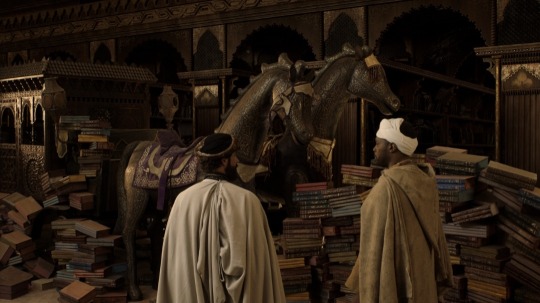

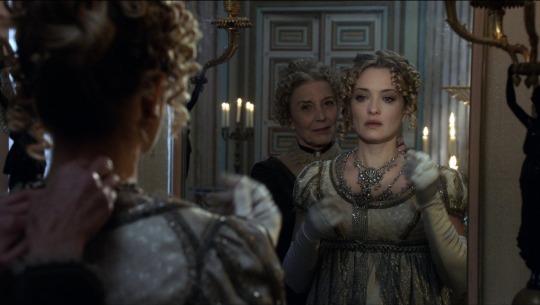




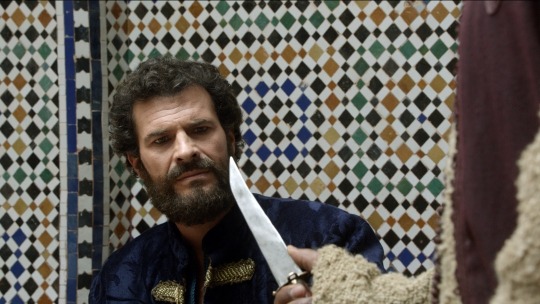

(I have found more pics about the film, but for thid post these are enough)
#de sable et de feu#sabbie e fuoco#sand and fire#el sueño del califa#el sueño envenenado#souheil benbarka#films#period dramas#rodolfo sancho#giancarlo giannini#carolina crescentini#marisa paredes#imanol arias#halid basket#omar azzouzi#marco bocci#massimo ghini#abdelaziz bouzaoui#kamal moummad#younés kerkour#christo jivkov#ulisse provolo#jean-pierre andré douay#domingo badía i leblich#ali bey al abbassi#hester stanhope#meleki of palmyra#slimane of morocco#sulayman of morocco#manuel godoy
9 notes
·
View notes
Text
HISTORY
hello, I am Myiesha Hanne Cortes Quiban from Grade 6-Faith, I like learning, History, Geography, Politics and culture.
and I will introduce you Napoleon Bonaparte
History is the study of change over time, and it covers all aspects of human society. Political, social, economic, scientific, technological, medical, cultural, intellectual, religious and military developments are all part of history.

later known by his regnal name Napoleon I, was a French military commander and political leader who rose to prominence during the French Revolution and led successful campaigns during the Revolutionary war. He was the leader of the French Republic as First Consul from 1799 to 1804, then of the French Empire as Emperor of the French from 1804 until 1814, and briefly again in 1815. His political and cultural legacy endures as a celebrated and controversial leader. He initiated many enduring reforms, but has been criticized for his authoritarian rule. He is considered one of the greatest military commanders in history, although historians still debate whether he was responsible for the Napoleonic Wars in which between three and six million people died.
Napoleon was born on the island of Corsica into a family descending from Italian nobility. He was resentful of the French monarchy, and supported the French Revolution in 1789 while serving in the French army, trying to spread its ideals to his native Corsica. He rose rapidly in the ranks after saving the governing French Directory by firing on royalist insurgents. In 1796, he began a military campaign against the Austrians and their Italian allies, scoring decisive victories, and became a national hero. Two years later he led a military expedition to Egypt that served as a springboard to political power. He engineered a coup in November 1799 and became First Consul of the Republic. In 1804, to consolidate and expand his power, he crowned himself Emperor of the French.
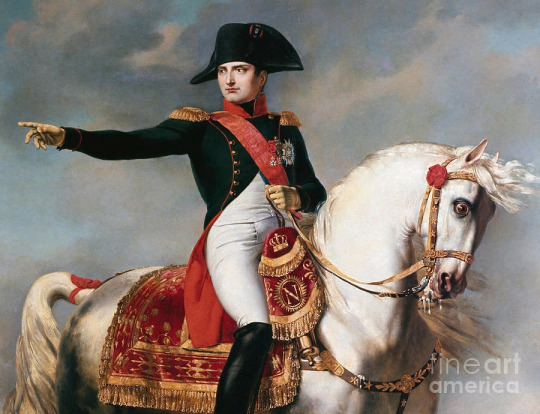
Differences with the United Kingdom meant France faced the War of the Third Coalition by 1805. Napoleon shattered this coalition with victories in the Ulm campaign and at the Battle of Austerlitz, which led to the dissolution of the Holy Roman Empire. In 1806, the Fourth Coalition took up arms against him. Napoleon defeated Prussia at the battles of Jena and Austerlitz , marched the Grande Armée into Eastern Europe, and defeated the Russians in June 1807 at Friedland, forcing the defeated nations of the Fourth Coalition to accept the Treaties of Tilsit. Two years later, the Austrians challenged the French again during the War of the Fifth Coalition, but Napoleon solidified his grip over Europe after triumphing at the Battle of Wagram.
Hoping to extend the Continental System, his embargo against Britain, Napoleon invaded the Iberian Peninsula and declared his brother Joseph the King of Spain in 1808. The Spanish and the Portuguese revolted in the Peninsular War aided by a British army, culminating in defeat for Napoleon's marshals. Napoleon launched an invasion of Russia in the summer of 1812. The resulting campaign witnessed the catastrophic retreat of Napoleon's Grande Armée. In 1813, Prussia and Austria joined Russian forces in a Sixth Coalition against France, resulting in a large coalition army defeating Napoleon at the Battle of Leipzig. The coalition invaded France and captured Paris, forcing Napoleon to abdicate in April 1814. He was exiled to the island of Elba, between Corsica and Italy. In France, the Bourbons were restored to power.
Napoleon escaped in February 1815 and took control of France. The Allies responded by forming a Seventh Coalition, which defeated Napoleon at the Battle of Waterloo in June 1815. The British exiled him to the remote island of Saint Helena in the Atlantic, where he died in 1821 at the age of 51.
Napoleon had a lasting impact on the world, bringing modernizing reforms to France and Western Europe and stimulating the development of nation states. He also sold the Louisiana Territory to the United States in 1803, doubling the size of the United States. However, his exploitation of conquered territories, mixed record on civil rights, reintroduction of slavery in France's colonies, and repression of the Haitian Revolution are controversial and adversely affect his reputation.
and that's all I hope you enjoyed it thank you
#napoleon#history#europe#napoleonic era#napoleonic wars#napoleon bonaparte#france#paris#french empire
3 notes
·
View notes
Text
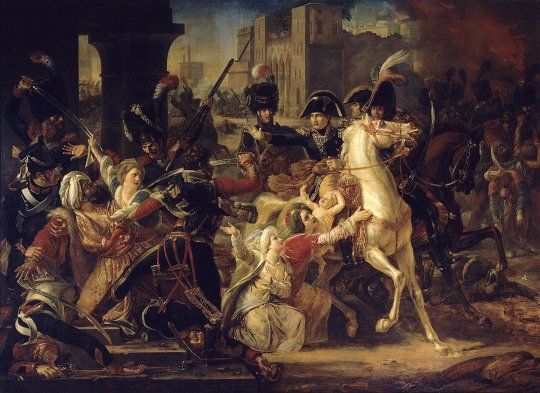
Entry of General Bonaparte into Alexandria, 1798
Guillaume-François Colson, French
#General Bonaparte#Bonaparte#napoleon bonaparte#1798#napoleon#napoleonic era#napoleonic wars#french empire#Guillaume-François Colson#Colson#egypt#alexandria#napoleon's egyptian campaign#egyptology#late 18th century#18th century#historical art#napoleon's invasion of egypt#empire style#regency#first french republic#french republic#french revolution#art#french art#history
30 notes
·
View notes
Text
Dear Neighbors, it’s time to dip our toes back into the adventure genre because the next review will be about a novel called “ At Aboukir and Acre: A Story of Napoleon’s Invasion of Egypt” by G. A. Henty, my old nemesis.
Why old nemesis? Well… Here’s one of my Frev reviews to explain why:
Anyway, stay tuned!
14 notes
·
View notes
Text
I got a book thinking it was titled "antiquated world's" and turned out it's "aquatinted worlds"
Aquatint is a kind of printing thing they did 1750's to 1850's where an etching print is made and then painted over with watercolour wash by "women and aspiring artists" in cottage industry.
It's still a good book, but has too much to say and not enough pictures. Not to sound like a toddler.
Have some anti-Napoleon propoganda from the invasion of Egypt.
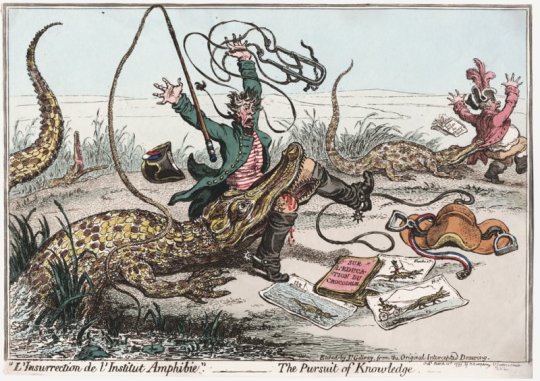
3 notes
·
View notes
Text
Turkish conquest 1820
Former Turkish
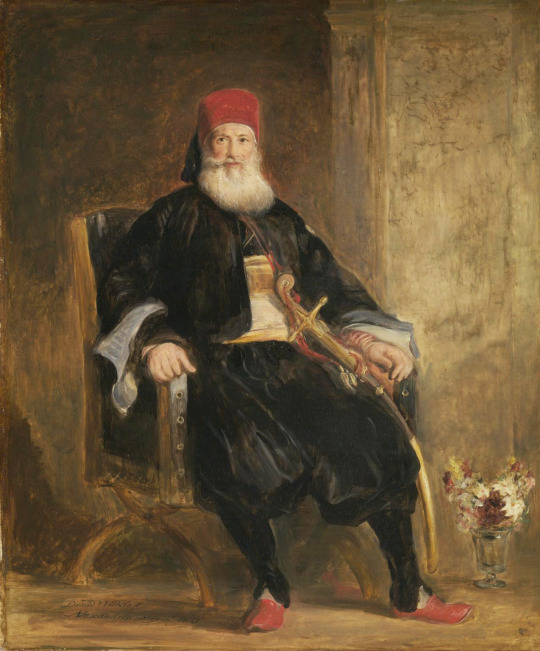
After Muhammad Ali Pasha ruled Egypt he wanted to have a strong army because of European ambitions to seize his country، Especially after the French campaign against Egypt led by Napoleon Bonaparte, which lasted from 1798 and ended only with the peace that the French held with the British in 1802, then England tried to invade Egypt in 1807, when it was known as the Fraser campaign But the popular resistance in Rashid repelled their invasion. The Pasha worked hard to expand his rule east to the Hijaz, west to Libya and south to Sudan, to include these countries under his empire, so that he included in his threat the Ottoman Empire itself. He started with the lands of Hijaz, and he attacked them in the years between 1811
1818 AD and defeated the Saudis, and then he headed west, so he secured his western borders until the Siwa oasis in 1820.
He only had to secure the southern border، His campaigns against Hijaz occupied him previously until he sent a delegation that apparently carried friendship and affection to Sultan Al-Fung in 1813 and the delegation's mission was to investigate the facts about the political, social, economic and war situation. The delegation carried gifts to the Sultan valued at 4 thousand riyals ( The currency prevailing in Sudan at that time was the Austrian, Spanish or Mexican riyal ) The Sultan replied in proportion to the wishes of the Pasha, but The most important thing that the delegation carried on its way back was reports that the Sultanate was particularly weak and Sudanese in general, in addition to Sudan's lack of firearms. Nevertheless, the invasion was later several years later, because the Wahhabis had not yet broken their thorn.
Muhammad Ali wanted his army to be modern and equipped with the latest weapons and with a modern system and training, but he knew that his soldiers would not accept this system because of their lack of interest and because of their unwillingness to obey orders. He decided to bring in the soldiers from Sudan, and this was one of the reasons that led him to take over Sudan. The Sudanese, with his military standing and his usual courage, were among the best soldiers. Sudan has been famous since ancient times for its lands rich in gold, and Muhammad Ali needed it to spend it on his country militarily, industrially, and even agricultural.
During the eighteenth century, Abyssinia was a threat to Egyptians and Sudanese by turning it into the Nile, especially after reports that the British and Europe in general were supportive of the idea of conversion. Muhammad Ali wanted to believe this matter also by seizing Sudan, in addition to the increase in the agricultural area of his lands. Muhammad Ali wanted the Sudanese to be friendly with the governor, but it was not so, as the Mamluks who fled his machinations took from northern Sudan their home near the Kingdom of Shaqiya، Where they created a kingdom for them that was a stab in the back of Muhammad Ali, so he decided to eliminate them for fear that their authority would increase and control Sudan, and they would pose a threat to his rule. Muhammad Ali was aiming to exploit Sudan's trade, monopolize its crops and market it in the global market through Egypt. Among the most important exports of Sudan at the time: ivory, ebony, feathers of ostrich and leather, in addition to the gold that the Egyptians have long believed in the Sudan in huge quantities, and that Sudan was a good market for Egyptian exports. If we limit these reasons, we find them:
Securing the country against the European invasion by bringing in soldiers from Sudan. And by increasing the area and population of his country.
Obtaining financing to support the various sectors in Egypt by exploiting Sudanese gold, trade and crops.
The Nile Stream Insurance is the only source of irrigation of Egyptian lands and an increase in agricultural area.
The presence of Mamluks in Sudan.
After the return of the Egyptian-Turkish delegation sent by Muhammad Ali Pasha, he soon came to Egypt Sheikh Bashir and Deed Colonel from Umm Al-Bird village near Atbara in 1816 and asked Muhammad Ali to appoint him to His opponent, the king of the Jailites, who had excluded him from his sheikhdom, believed that the Pasha would help him, so the Pasha kept him and honored his delegation until he prepared the kit to open Sudan and sent him with the army in 1820، Then he appointed him as a sheikh over Shandi in the end, after the displacement of the Mec Nimr to Abyssinia. He also sent another army to the Sultanate of Fur to take over Kordofan and Darfur.
3 notes
·
View notes
Text
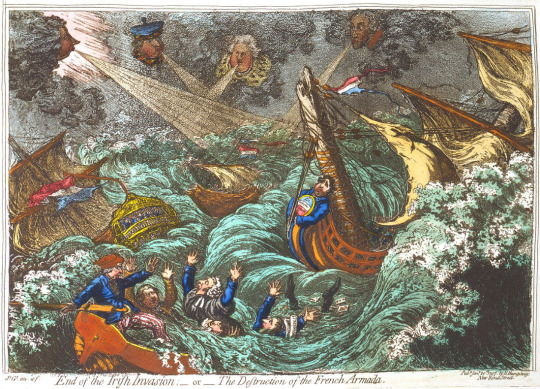
The End of the Irish Invasion, a political cartoon from 1797 by James Gillray. It caricatures politicians of the time, such as Charles James Fox and Richard Brinsley Sheridan, who were thought to support the rebellion.
Today is the day that Wolfe Tone was finally captured by the British, bringing a final and dramatic end to the 1798 rebellion. Tone's original plan with the rebellion had been to convince the French to invade Ireland, bringing their revolutionary ideals with them and hopefully throwing out the British once and for all. This was negotiated with the French government by Tone, Arthur O'Connor, and Lord Edward Fitzgerald, though Tone, who had been working for the French army for a while after being exiled from Ireland, was left to see it through. The plan almost worked--Tone and a fleet of ships under Louis Lazare Hoche were close enough to the Irish coast to be seen from onlookers on the shore, but due to harsh weather they could not land.
Returning to France, Hoche soon died of tuberculosis, meaning that a fellow who I'm sure no one has ever heard of called Napoleon Bonaparte could swoop in and take all of the ships to Egypt, leaving Tone again alone. The Rising broke out in Ireland in 1798, following which Tone was able to convince the French to send several smaller raids to Ireland, though they were quickly crushed. He went along on the last one, which turned into the Battle of Tory Island, where he refused an offer to escape and was captured when his ship the Hoche was forced to surrender. He was taken onto the land, formally arrested, and marched away to Dublin to await trial.
#there will be another post continuing this. soon. on his death day#also /s for the bit about nobody knowing about napoleon#wolfe tone#arthur o'connor#lord edward fitzgerald#louis hoche#napoleon bonaparte#1798 rebellion#irish history#tw violence#tw illness#jory.txt
3 notes
·
View notes